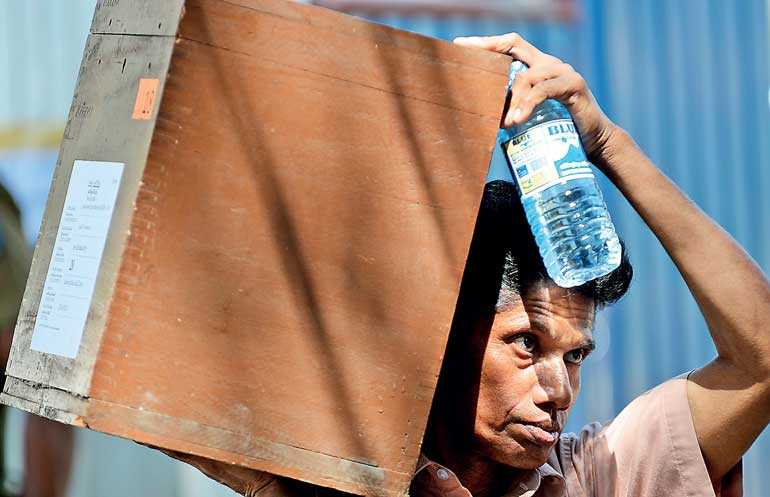Friday Feb 20, 2026
Friday Feb 20, 2026
Wednesday, 10 April 2019 01:22 - - {{hitsCtrl.values.hits}}

Application of human rights principles, when taken with necessary responsibilities, could play a major role in national reconciliation, but not limited to that. Human rights have a broader meaning and value when applied in a progressive and a realistic manner to improve not only people’s civil and political rights but also economic, social and cultural rights. This kind of a general upliftment of human rights across ethnic, religious, regional, class or gender distinctions can immensely contribute to the goal of national reconciliation.
When people have recognised rights, it is the duty of the Government and the office holders (i.e. duty bearers) to fulfil them, while the people themselves should exercise these rights with responsibility.
Necessity of elections
In the immediate context, the holding of Provincial Council Elections without delay is a must to ensure people’s fundamental rights to elect their representatives (not ‘rulers’ as some people define!) to the provincial councils. This is most important in the case of the Northern and the Eastern Provinces. Otherwise, what is the point of devolution, provincial councils and the talk about reconciliation?
Sri Lanka is a representative democracy (Preamble to the Constitution); presently at three levels of national, provincial and local. According to Article 3 of the Constitution, “In the Republic of Sri Lanka sovereignty is in the People and is inalienable. Sovereignty includes the powers of Government, fundamental rights and the franchise.” Therefore, franchise is most fundamental to people’s sovereignty, apart from Government and fundamental rights.
Article 21 of the Universal Declaration of Human Rights (UDHR) says “Everyone has the right to take part in the government of his country, directly or through freely chosen representatives.” When it says ‘in the Government,’ it means the Government at various levels and the level of the province is most important in terms of devolution at present in Sri Lanka.
Article 21 (3) particularly says, “The will of the people shall be the basis of the authority of government; this will/shall be expressed in periodic and genuine elections which shall be by universal and equal suffrage and shall be held by secret vote or by equivalent free voting procedures.” Without the ‘will of the people’ there is no proper authority for the provincial governments. To carry out this authority, there should be ‘periodic and genuine elections’.
Not holding elections to the provincial councils is a violation of all these norms and principles by the UNF Government. If there were ambiguities or differences about the electoral system, and the law pertaining to holding elections, four years since the assumption of Government in January 2015, even without a proper majority at the beginning, is a fair enough time to sort out these matters. Not doing so is either utter incompetence or callous disregard for democracy and will of the people.
Dismantling of Provincial Councils?
The term of the Northern Provincial Council expired in September 2018. Now what you have is direct Governor’s rule, however mild it could be. The last Provincial Council, with C.V. Wigneswaran as the Chief Minister, was the only elected council for the province for the last 32 years. When the first elections for the council was about to be held in September 2013, Lisa Curtis of The Heritage Foundation said the following:

“Tomorrow, for the first time in 25 years, Sri Lanka will hold elections to its Northern Provincial Council, a step that could facilitate reconciliation between the country’s majority (mostly Buddhist) Sinhalese and minority (mostly Hindu) Tamil populations.”
One may consider the statement to be too optimistic, but there was a significant truth in it. It is strange that the UN Human Rights Council or its High Commissioner has not noticed this aberration of human rights by not holding elections for the Northern Provincial Council for the last six months. Even a Minister like Mangala Samaraweera, who pretends to be a champion of human rights, is mum about the matter.
Much worse is the case of the Eastern Provincial Council which had lapsed since September 2017, now for 18 months. Holding of elections for all other provincial councils is of similar importance because voting and elections are most treasured in people’s political rights. It is important for reconciliation itself as Lisa Curtis hoped.
The appreciation of devolution of power by the people in the south largely hinges on what they also receive as devolution. The considerable change of position on devolution by the JVP and certain sections of the SLFP depended largely on this factor. They opposed devolution at its introduction in 1987.
Repercussions of not holding elections
Not holding elections, arbitrarily fixing them, or postponing them can have major repercussions on political frustration, emergence of rebellion, conflicts and violence. Even the Local Government Elections that were finally held in February 2018 were conducted only after seven years to majority of the councils (322).
The usual term of a Local Government institution is four years with the possibility of extending up to one year. The previous elections to these councils were held in 2011, and the terms expired in March 2015. Although the terms were extended to May 2015, since then all these were dissolved or dismantled. People in these areas were without local councils or people’s representatives for nearly two years or 21 months.
That was a major reason why the voters rebelled against the incumbent Government, and its allies, and overwhelming supported a reconstituted new political party, Sri Lanka People’s Front (SLPP), although under discredited old leaders. Similar political trends could be seen even in the North, going against the establishment and established political parties at the same elections.
The situation in the north was more damaging than in the south without holding elections to local councils for a very long period of time. A major reason undoubtedly was the war situation, but even after that, for example, Local Elections were not held in the Mullaitivu District in 2011. Therefore by February 2018, the vacuum was so vast.
When we look further back, not holding Local Government Elections between 1977 and 1987, the ambiguous experiments of District Development Councils (DDC) coming in between, had major repercussions on the alienation, frustration and disillusionment of minority communities and the youth. More disastrous and despicable were the rigging of the DDC Elections in Jaffna and burning of the Jaffna Library in 1981.
It is true that populist parties can utilise election processes to consolidate their political powers as we could witness from the Rajapaksa Government during 2005 and 2015. This happens particularly when the other political parties are backward, lethargic or out of touch with the people. This is also not a reason for those parties to postpone or not holding elections when they come into power. Unfortunately, this is exactly the situation at present. Polarisation on ethnic or religious lines also could happen under such circumstances, extreme political rhetoric and programs gaining currency.
Holding of elections to the provincial councils without delay is a must for national reconciliation and ensuring the most important political right of the people in general and all over the country. If not, more polarisation could be seen in the coming period and particularly at the unavoidable presidential elections by the end of the year.
Present measures on reconciliation
There is no doubt that the present Government has taken some important measures and steps towards national reconciliation in terms of addressing the past. (1) Release of the private land held by the military during the war to the original owners, (2) the establishment of the Office of the Missing Persons, and (3) the recent establishment of the Office on Reparation could be considered the most important three measures. However, addressing the current and the present requirements for reconciliation is also important.
A draft on Counter-Terrorism Act is also now submitted to replace the existing Prevention of Terrorism Act (1978). There are serious concerns however that in certain areas, the proposed legislation could be more draconian than the existing one. If that is the case, it is a serious human rights issue that should be addressed. A concept paper has also been submitted to the Cabinet on a bill to establish a Truth and Reconciliation Commission, the content of which is not yet known.
It has to be admitted that even the previous Government also took some measures, within their own point of view, in addressing some of the issues of the war affected and addressing the past. ‘Rehabilitation, Resettlement and Reconstruction’ or the three ‘R’s as they said were some of their pet topics. The Lessons Learnt and Reconciliation Commission (LLRC) was appointed within one year after the end of the war and the report was submitted within 18 months thereafter. But the implementation of the LLRC recommendations was terribly slow or hesitant.
The present Government is also slow although it has gone quite faithfully in line with the ‘international community’ in selecting measures and in implementing them. Most controversial has been the co-sponsoring of all the resolutions submitted in the UNHRC since the most questionable resolution 30/1 in October 2015 drafted by the US.
Conclusion
The question is whether the above line of strategy would facilitate reconciliation in the country or trigger more controversies, if not future conflicts? Slow implementation or vacillations have already frustrated many sections of the Tamil community. Some are undoubtedly asking for the ‘pound of flesh.’ It is almost 10 years since the end of the war. What we have seen recently at UNHRC is the second rollover.
There is also a strong opinion that the UNHRC resolutions are more of ‘black mailing’ a strategically important small country than genuinely addressing human rights or reconciliation issues. It could be a combination of both. There is an apparent alignment between certain sections of the present government and those who execute this international strategy. A clear slant of all of them is a thrust against the previous Government or the present Opposition. But to any independent observer, reconciliation requires the participation of all stakeholders, representatives of all communities, and political parties. Otherwise, it is not going to be sustainable. A major mistake of this Government in their reconciliation strategy has been the side-lining of the representatives of the last Government or the Joint Opposition.
As we have argued from the beginning, most important at present is the holding of Provincial Council Elections without any further delay.